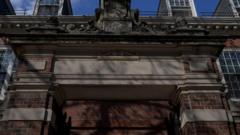The ongoing conflict between the Trump administration and Harvard University reached a judicial standoff when a federal judge issued a temporary restraining order preventing the administration from revoking Harvard's access to international student programs. The decision has significant implications for thousands of international students at Harvard, who now face uncertainty about their future.
Judge Halts Trump Administration's Plan to Curb Harvard's International Enrollment

Judge Halts Trump Administration's Plan to Curb Harvard's International Enrollment
A federal judge has issued a temporary injunction against the Trump administration's decision to strip Harvard University of its ability to enroll foreign students, amidst escalating tensions between the university and the White House.
A federal judge has intervened in the dispute between Harvard University and the Trump administration by issuing a temporary restraining order. This ruling blocks the administration's recent decision to revoke Harvard's access to the Student and Exchange Visitor Program (SEVP), a government system managing foreign student enrollment.
Harvard's lawsuit claims that the administration's actions are a "blatant violation" of legal and free speech protections. The administration has accused Harvard of inadequately addressing antisemitism and necessitating a shift in its hiring and admissions strategies—accusations that Harvard denies.
Judge Allison Burroughs issued her ruling on Friday, pausing the government's move as tensions simmer in an escalating conflict. Harvard, which claimed that international students constitute a significant part of its student body, emphasized the adverse impacts on its mission. "With the stroke of a pen, the government has sought to erase a quarter of Harvard's student body," the university argued, as President Alan Garber described the actions as illegal and unwarranted.
In response to the court's decision, White House deputy press secretary Abigail Jackson criticized the ruling. She suggested that such judicial actions were an overreach and claimed that the judges involved had a "liberal agenda."
For students, particularly those from abroad, the announcement's timing is particularly unsettling as they prepare for graduation. The order cast uncertainty over hundreds of foreign students unsure about their ability to stay and work in the U.S. after earning their degrees. Cormac Savage, a graduating student from Northern Ireland, expressed his anxiety about the implications of the ruling, revealing the difficulty of planning for the future amid shifting immigration policies.
The university hosts around 6,800 international students, accounting for over 27% of its student population. Many of these students, including those from China, India, and the UK, have expressed concern about the long-term effects of the administration's policies on their educational opportunities.
Eliminating foreign students from Harvard would not only affect academic diversity but also have financial repercussions, as international students typically pay full tuition rates. Experts estimate that undergraduate tuition at Harvard, excluding additional costs, will approach $60,000 in the upcoming academic year.
As the legal battle continues, Harvard leaders remain committed to defending their institution's autonomy against federal attempts to exert control over its operations. The next hearing is set for May 29 in Boston, where the judicial outcomes could set precedents for similar cases nationwide. The unfolding situation reflects broader tensions regarding immigration policy and academic freedom in the U.S., influencing the experiences of students navigating this uncertain landscape.




















